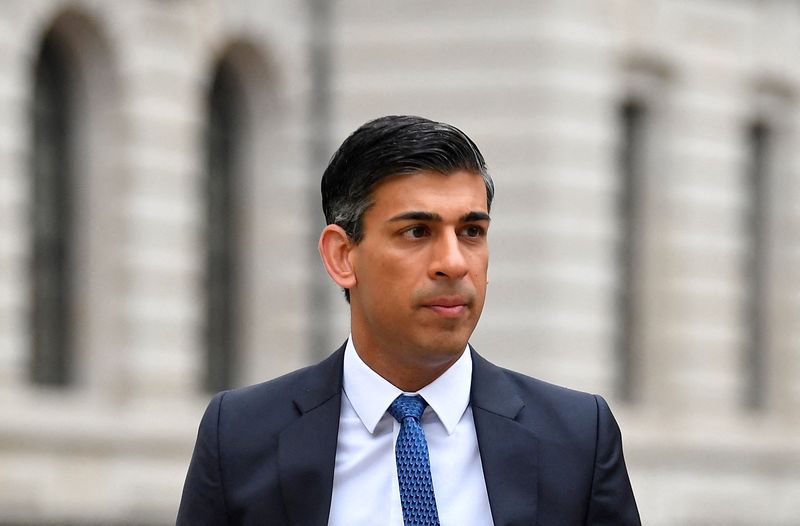By Andy Bruce
LONDON (Reuters) - British finance minister Rishi Sunak has toughened his language towards Bank of England Governor Andrew Bailey, a reflection of the political pressure piling on them both as inflation surges towards double digits.
On Thursday the BoE stuck to its gradual increases in interest rates, as other central banks took more urgent action, but said it was ready to act "forcefully" if needed to stamp out dangers posed by inflation.
The BoE also published an exchange of letters between the governor and finance minister in which Bailey is required to explain why inflation - now at 9% and set to surpass 11% in October, according to the BoE - is overshooting the central bank's 2% target.
Usually, these letters are unremarkable, but this week Sunak adopted a noticeably harder tone in his response to Bailey.
"I know and expect that you and the other members of the MPC will take the action necessary to get inflation back on target and ensure inflation expectations remain firmly anchored," Sunak said in his letter to Bailey.
On May 26, as he announced further cost-of-living support for households, Sunak said: "I know the governor and his team will take decisive action" - rather than "know and expect".
Sunak's new choice of words also contrasts with the passive tone in a similar exchange of letters in March, when Sunak said: "I welcome the Committee's intention ... to take whatever action is necessary."
Some members of Prime Minister Boris Johnson's Conservative Party have openly criticised the BoE for acting too slowly over the mounting cost-of-living crisis. Public satisfaction with the central bank has hit a record low.
Andrew Goodwin, chief UK economist at consultancy Oxford Economics, said he doubted that the BoE faced serious, immediate dissatisfaction from the government over its performance on inflation, which is testing central banks around the world.
But it could help Sunak fend off critics who say he has failed to help households sufficiently despite pledging 37 billion pounds ($45.4 billion) of government support since the start of last year, excluding the impact of tax rises for many people.
"It gives him cover to effectively say, 'well I would do more, but (the BoE) can't get inflation under control so this is tying my hands' - which is I don't think is true," Goodwin said.
"But it's a good narrative to have if you're clear that you don't want to expand fiscal policy any more."
Elsewhere in his latest letter, Sunak adopted more urgent language than in previous missives. He told Bailey that he recognised the impact of high inflation on households, "which is why, as you outline, it is imperative to bring inflation back down to target it and keep it anchored there".
"In conclusion, we have the tools and determination we need to reduce inflation and I am confident the Bank will play their part in making that happen," Sunak said.
Judging from its June policy minutes, the BoE itself showed little outward sign of political pressure, HSBC noted.
"The BoE still seems determined to paddle its own canoe, worrying more about the growth and unemployment risks - and their implications for inflation - than the risk of second-round effects and high inflation becoming embedded," said HSBC economists Elizabeth Martins and Simon Wells.

"Nor does it seem particularly concerned by being in the spotlight politically."
($1 = 0.8155 pounds)